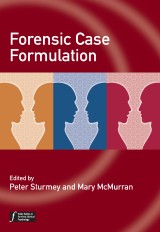Details

Forensic Case Formulation
Wiley Series in Forensic Clinical Psychology, Band 49 1. Aufl.
|
43,99 € |
|
| Verlag: | Wiley-Blackwell |
| Format: | EPUB |
| Veröffentl.: | 17.08.2011 |
| ISBN/EAN: | 9781119976899 |
| Sprache: | englisch |
| Anzahl Seiten: | 336 |
DRM-geschütztes eBook, Sie benötigen z.B. Adobe Digital Editions und eine Adobe ID zum Lesen.
Beschreibungen
<p><b><i>Forensic Case Formulation</i> is the first text that describes the principles and application of case formulation specifically to forensic clinical practice.</b></p> <ul> <li>Addresses risk assessment and its implications for case formulation and treatment</li> <li>Covers a range of serious forensic problems such as violence, sexual offending, personality disorder, and substance misuse</li> <li>Offers guidance in training clinicians on ways to create useful formulations</li> </ul>
List of Contributors. <p>Series Editors' Preface.</p> <p>Editors' Preface.</p> <p><b>GENERAL ISSUES.</b></p> <p>Chapter 1. Theoretical and Evidence-Based Approaches to Case Formulation (<i>Tracey D. Eells and Kenneth G. Lombart, University of Kentucky, USA</i>).</p> <p>Chapter 2. Current Issues in Case Formulation (<i>Gregory H. Mumma, Texas Tech University</i>).</p> <p>Chapter 3. Does Case Formulation Make a Difference To Treatment Outcome? (<i>Ata Ghaderi, Uppsala University, Sweden</i>).</p> <p><b>VIOLENCE.</b></p> <p>Chapter 4. Formulation of Violence Risk Using Evidence-Based Assessments: The Structured Professional Judgment Approach (<i>Stephen D. Hart, Simon Fraser University and University of Bergen and Caroline Logan, Greater Manchester West Mental Health NHS Foundation Trust and University of Manchester</i>).</p> <p>Chapter 5. Cognitive-Behavioral Approaches To Formulating Aggression And Violence (<i>Kevin Howells, University of Nottingham, UK</i>).</p> <p>Chapter 6. Formulation of Serious Violent Offending Using Multiple Sequential Functional Analysis (<i>Aidan J. P. Hart, David M. Gresswell,University of Lincoln and Louise Braham, University of Nottingham</i>).</p> <p>Chapter 7. Forensic Case Formulation, Substance Abuse Disorders and Anger (<i>Ellen Vedel, Jellinek Substance Abuse Treatment Center and Paul M. G. Emmelkamp, University of Amsterdam</i>).</p> <p><b>SEXUAL OFFENDING.</b></p> <p>Chapter 8. Sexual Offenses Against Children (<i>James Vess & Tony Ward, Victoria University of Wellington, New Zealand</i>).</p> <p>Chapter 9. Sexual Offenses Against Adults (<i>Stacey L. Shipley, North Texas State Hospital and Bruce A. Arrigo, University of North Carolina – Charlotte</i>).</p> <p><b>SPECIFIC POPULATIONS.</b></p> <p>Chapter 10. Forensic Case Formulation with Children and Adolescents (<i>Phil Rich, Stetson School, Massachussetts</i>).</p> <p>Chapter 11 Formulating Offending Behaviour In People With Mild Learning Disabilities (<i>William Lindsay, University of Abertay Dundee, UK</i>).</p> <p>Chapter 12. Case formulation for Individuals With Personality Disorder (<i>Lawrence Jones, Nottinghamshire Healthcare NHS Trust, United Kingdom</i>).</p> <p><b>CONCLUSION.</b></p> <p>Chapter 13. Forensic Case Formulation: Emerging Issues (<i>Peter Sturmey, City University of New York and Mary McMurran, University of Nottingham, United Kingdom</i>).</p>
<b>Peter Sturmey</b> is Professor of Psychology at Queens College and The Graduate Center, City University of New York. He has published extensively on developmental disabilities, applied behavior analysis, and on issues relating to staff and parent training. <p><b>Mary McMurran</b> is Professor in the University of Nottingham's Institute of Mental Health. She has written extensively on personality disorders, alcohol-related aggression, and readiness to engage in therapy.</p>
Effective assessment and treatment of offenders is important for reducing the likelihood of further offending. Understanding the processes which initiate and maintain offending behaviour is integral to the design and evaluation of appropriate, individually-tailored interventions. <i>Forensic Case Formulation</i> describes the principles and application of case formulation specifically for forensic clinical practice. <p>In this edited volume, contributors review the fundamental aspects of case formulation, including definitions, reliability and validity. The practical applications of case formulation applied to violence, sexual offenses personality disorder, and substance abuse are described, and illustrated with case studies. Also covered is the interrelationship between case formulation and risk assessment. <i>Forensic Case Formulation</i> offers rich insights into the use of case formulation with forensic clients.</p>
Peter Sturmey and Mary McMurran have edited an excellent book on forensic case formulation for this Wiley-Blackwell series. The authors of the chapters are well respected experts in the forensic field. Readers who work in forensic services will find the chapters on case formulation both informative theoretically and helpful clinically. Work with offenders will be enhanced by assimilating the ideas and suggestions in this book.<br /> —<b><i>Kate Davidson</i></b><i>, Professor of Clinical Psychology, University of Glasgow, UK</i>
Diese Produkte könnten Sie auch interessieren:

The Wiley-Blackwell Handbook of Childhood Social Development

von: Peter K. Smith, Craig H. Hart

136,99 €
















